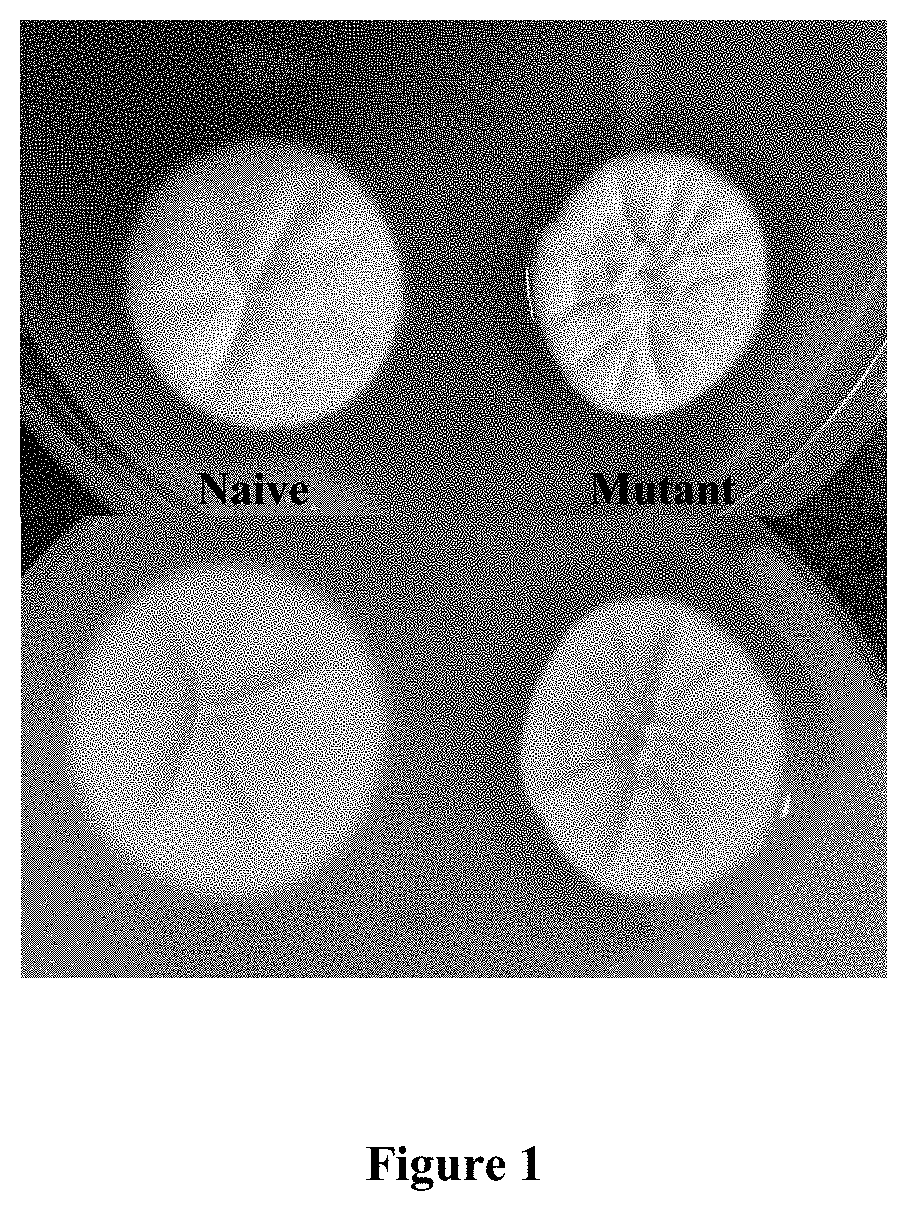Method for preparation and screening of fungal mutant with high hydrolytic activity and catabolite derepressed character
a technology of catabolite and mutant, which is applied in the field of hypercellulolytic and catabolite derepression mutant of ascomycetes fungus, can solve the problems of high cost factor of cellulosic ethanol process, insufficient amount insufficient production of cellulases enzymes of wild type fungal strains, etc., and achieves high titer
- Summary
- Abstract
- Description
- Claims
- Application Information
AI Technical Summary
Benefits of technology
Problems solved by technology
Method used
Image
Examples
example 1
Mutagenesis Procedure for Preparing Mutant Fungal Strain Penicillium Funiculosum MRJ-16
[0044]Spore suspension (approx. 1×106 Spore / mL) of naive strain was prepared in sterile saline containing 0.1% Tween-80 from a 7 day old Potato dextrose agar (PDA) culture grown at 30° C. Spore suspension was subjected to chemical mutagenesis by treating them with ethyl methanesulfonate (EMS) or diethyl sulfate (DES) of concentration about 10-50 μL / mL spore suspension or both at 1:1 concentration for 15 hours under dark at room temperature. This was followed by physical mutagenesis of suspension with UV light (254 nm, Philips TUV-30 W lamp) for 2-5 min at a distance of 15 cm in a wooden UV-box. The spore suspension after combined mutagenesis was spread (100 μL) onto screening media containing 0.3% -0.5% wt. amorphous cellulose and 0.5-3% glucose. The plates were incubated under dark at 30° C. for 4-6 days and colonies with cellulolytic activity were visually detected by observing a clear transpare...
example 2
Screening of an Efficient Mutant for Enzyme Production
[0045]The naive strain of Penicillium funiculosum NCIM 1228 was used to create mutants for enzyme production. Mutations were done using UV or NTG or EMS mutagens alone or all together. The mutant strains were obtained after repeated multi-stage mutagenesis process. Mutants were selected sequentially on specially designed media containing amorphous cellulose and glucose at different concentration from 1-4% (w / w) (screening media composition in table 1). Naive strain didn't hydrolyze amorphous cellulose in the presence of glucose. Mutant strain that hydrolyzes the amorphous cellulose in the presence of 3% glucose was selected after visualizing and measuring the hydrolyzed zone. Stability of mutant stain for enzyme production capability was tested for multiple cycles and then used for further study.
TABLE 1Screening media compositionS. No.Chemical ComponentsQuantity (g / L)1Ammonium Sulphate1.42KH2PO42.03MgSO4•7H2O0.34CaCl2•3H2O0.35Ure...
example 3
Screening of an Efficient Mutant for Enzyme Production
[0047]The naive strain of Penicillium funiculosum NCIM 1228 was used to create mutants for enzyme production. Mutations were done using UV or NTG or EMS mutagens alone or all together. The mutant strains were obtained after repeated multi-stage mutagenesis process. Mutants were selected sequentially on specially designed media containing amorphous cellulose and glucose at different concentration from 1-4% (w / w) (screening media composition in table 2). Naive strain didn't hydrolyze amorphous cellulose in the presence of glucose. Mutant strain that hydrolyzes the amorphous cellulose in the presence of 4% glucose was selected after visualizing and measuring the hydrolyzed zone. Stability of mutant stain for enzyme production capability was tested for multiple cycles and then used for further study.
TABLE 2Screening media compositionS. No.Chemical ComponentsQuantity (g / L)1Ammonium Sulphate2.42KH2PO43.03MgSO4•7H2O0.14CaCl2•3H2O0.15Ure...
PUM
| Property | Measurement | Unit |
|---|---|---|
| Time | aaaaa | aaaaa |
| Fraction | aaaaa | aaaaa |
| Distance | aaaaa | aaaaa |
Abstract
Description
Claims
Application Information
 Login to View More
Login to View More - R&D
- Intellectual Property
- Life Sciences
- Materials
- Tech Scout
- Unparalleled Data Quality
- Higher Quality Content
- 60% Fewer Hallucinations
Browse by: Latest US Patents, China's latest patents, Technical Efficacy Thesaurus, Application Domain, Technology Topic, Popular Technical Reports.
© 2025 PatSnap. All rights reserved.Legal|Privacy policy|Modern Slavery Act Transparency Statement|Sitemap|About US| Contact US: help@patsnap.com

